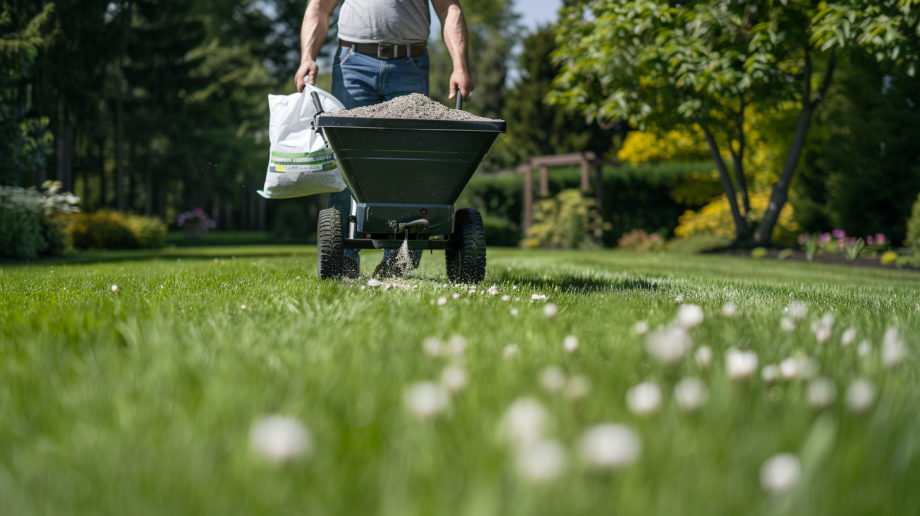
Liquid or Granular Fertilizer – What’s the Best Option for Your Lawn?
When choosing between liquid and granular fertilizers for your lawn, consider this: both contain essential nutrients, but differ in application and effectiveness. Liquid fertilizers provide immediate absorption and quick results, ideal for instant greening and growth. Granular fertilizers slowly release nutrients over time, supporting consistent growth, especially for larger lawns. While liquid fertilizers can be pricey initially, they’re cost-effective for small lawns. Granular fertilizers could be more economical for large lawns long term. Considering these factors will guide you to the right choice. Keep going, there’s much more to discover about lawn care tactics.
Key Takeaways
- Liquid fertilizers provide quick nutrient absorption and uniform coverage, making them suitable for immediate results and smaller lawns.
- Granular fertilizers offer a slow-release, long-lasting nutrient supply, ideal for larger lawns and established growth patterns.
- The cost-effectiveness of liquid versus granular fertilizers varies, with liquid being pricier per application but potentially economical for small lawns.
- The nutrient absorption efficiency of liquid fertilizers is higher, providing immediate benefits, while granular fertilizers support sustained growth over time.
- Storage and application convenience differ, with liquid fertilizers requiring careful storage and easier application, while granular types may require specific spreading equipment.
Understanding Fertilizer Composition
To understand the differences between liquid and granular fertilizers, one must first grasp their composition – both types contain necessary nutrients such as nitrogen, phosphorus, potassium, and various micronutrients. The key difference lies in their physical form and the way plants absorb these nutrients.
When comparing granular vs liquid fertilizer, you’ll find that the nutrient absorption process differs. Liquid fertilizer composition allows rapid absorption into the soil and plant roots, providing quick results. Conversely, granular fertilizers are slow-release products, gradually providing nutrients to your plants.
Application efficiency also varies between these fertilizers. Liquid fertilizers, easily mixed with water, offer uniform coverage, ensuring all your plants receive the required nutrition. Granular fertilizers, however, require careful application to avoid clumping and uneven nutrient spread.
Lastly, consider the cost and environmental impact. Liquid fertilizers can be cost-effective for small lawn areas, but for larger lawns, granular fertilizers may be more economical due to less frequent applications. In relation to environmental impact, liquid fertilizers have a lower risk of runoff, making them a more eco-friendly choice. Understanding these factors will help you choose the right fertilizer for your garden’s needs.
Application Methods: Liquid Vs Granular
Exploring the application methods of liquid and granular fertilizers can greatly influence the overall health and growth of your lawn. Liquid fertilizer vs granular, which one’s application method is more effective? It depends on your lawn’s needs.
Liquid fertilizers are typically applied using sprayers, ensuring even and immediate distribution of nutrients. This method is ideal for lawns that require quick results, as it allows for faster nutrient absorption. You can also use liquid fertilizers in combination with other lawn care products, making it a versatile choice. So, if you’re looking at liquid vs granular fertilizer for vegetables or other plants that need immediate nourishment, liquid could be your best bet.
On the other hand, granular fertilizers are spread using broadcast or drop spreaders. This method requires careful attention to avoid over-application or uneven coverage. However, it’s an excellent choice for larger lawns or those with established growth patterns. Granular fertilizer vs liquid often means a slower release of nutrients, providing a sustained feed for your lawn over time.
Choosing between spray fertilizer vs granular involves understanding these application methods and aligning them with your lawn care goals. Remember, the right application can make all the difference in your lawn’s health and appearance.
Benefits of Liquid Fertilizers
When it comes to nourishing your lawn quickly and effectively, liquid fertilizers offer several advantages that can make a substantial difference.
One of the primary liquid fertilizer benefits is the speedy absorption rate. Unlike granular fertilizers, which take time to dissolve and penetrate the soil, liquid fertilizers are readily available for your lawn’s immediate nutrient needs. This results in faster greening and growth, vital for lawns that need a quick boost.
The advantages of liquid fertilizer also include ease of application. You can easily mix these fertilizers with water and apply them using a sprayer. This method ensures even distribution, providing consistent coverage and nutrient absorption across your lawn.
Furthermore, the benefits of using liquid fertilizer extend to its blendability. It’s compatible with other lawn care products, allowing you to treat multiple lawn issues in one go. This is a time-saving advantage that can notably enhance your lawn care routine.
Advantages of Granular Fertilizers
While liquid fertilizers have their merits, you shouldn’t overlook the significant benefits that granular fertilizers bring to your lawn care regimen. A common question is, ‘Is granular fertilizer better than liquid?’ The answer lies in understanding the advantages of granular fertilizers.
One of the key benefits of granular fertilizers is their slow-release formula. Unlike their liquid counterparts that provide immediate results, granular fertilizers release their nutrients slowly over time. This slow-release property guarantees a consistent supply of nutrients, promoting uniform growth and greening of your lawn throughout the season.
Granular fertilizers are also more cost-effective, especially for larger lawns. They require fewer applications, saving you both time and money. Plus, when bought in bulk, granular fertilizers have a longer shelf life, offering an economical advantage over liquid fertilizers.
In addition, granular fertilizers are easier to handle and apply, reducing the risk of overapplication. Moreover, their more tangible nature allows for targeted application, ensuring that your lawn gets the right amount of nutrients where it needs them the most.
Consequently, granular fertilizers not only nurture your lawn but also foster a sense of belonging in your gardening journey.
Comparing Liquid and Granular Fertilizers
Having examined the benefits of granular fertilizers, let’s now compare them with liquid fertilizers to better understand which one might be the best choice for your specific lawn care needs.
When considering liquid vs granular fertilizer, it’s important to understand the unique advantages each one offers.
Liquid fertilizer benefits include quick absorption for instant greening and growth, making it ideal if you’re looking for immediate results. It also offers easier application and mixability with other lawn care products. Not to mention, its application efficiency guarantees you get consistent coverage every time.
On the other hand, granular fertilizer benefits lie in its long-lasting impact due to slow-release formulations. They’re also cost-effective, requiring fewer applications, and offer consistent growth over a longer period. Plus, if you buy in bulk, they’ve a longer shelf life.
While choosing between liquid and granular fertilizers, also consider the environmental impact. Liquid fertilizers have a lower risk of runoff, reducing nutrient pollution in nearby water bodies. Granular fertilizers, however, require careful application to avoid nutrient runoff during rain.
Your choice between liquid and granular fertilizers ultimately depends on your lawn’s specific needs, your budget, and your environmental awareness.
Nutrient Absorption Efficiency
To enhance the health and beauty of your lawn, understanding the nutrient absorption efficiency of both liquid and granular fertilizers is crucial.
Liquid fertilizer absorption efficiency is generally higher due to the nutrients being in a readily available form. They’re swiftly taken in through the leaves and roots, offering instant benefits. The effectiveness of liquid fertilizer also stems from its even application, ensuring every part of your lawn receives equal nourishment.
On the other hand, the application efficiency of granular fertilizer relies on factors such as your lawn’s moisture levels and temperature. These fertilizers take longer to decompose, and their nutrients are released gradually. This slow release is advantageous for the consistent growth of your lawn over an extended period. However, the absorption rate of granular fertilizer may be lower if not applied and watered correctly, potentially resulting in an uneven distribution of nutrients.
When considering nutrient absorption, liquid versus granular, take into account these aspects:
- Liquid fertilizers are rapidly absorbed, yielding immediate outcomes.
- Granular fertilizers release nutrients slowly, supporting sustained growth.
- Inefficient nutrient uptake may occur with uneven application of granular fertilizers.
- Liquid fertilizers provide uniform coverage for effective nutrient distribution.
Choosing between the two depends on your lawn’s specific requirements and your preferred maintenance practices.
Cost and Environmental Impact
When it comes to the cost and environmental impact of liquid versus granular fertilizers, there are key distinctions that can influence your choice. You might find that the cost of liquid fertilizer vs granular can vary considerably.
Liquid fertilizers, due to their concentrated nature, are typically more expensive per application than granular options. However, if you’ve got a smaller lawn, liquid fertilizer may be more cost-effective than granular because you’ll use less product per application.
In a liquid vs granular cost comparison, you must also account for the frequency of application. Granular fertilizers often need fewer applications, which can make them more economical in the long run for larger lawns.
As for the environmental impact of liquid vs granular fertilizer, liquid fertilizers have a lower risk of nutrient runoff, a noteworthy concern for local waterways. Granular fertilizers, if not properly applied, can contribute to excessive nutrient runoff during rainfall, potentially harming the environment.
Storage Considerations for Fertilizers
When considering your fertilizer options, don’t overlook the significance of storage, as both liquid and granular fertilizers come with their own set of storage requirements. Proper storage of fertilizers is essential to maintain their effectiveness and to ensure safety.
When it comes to the storage of liquid fertilizer, you need to consider several factors:
- Liquid fertilizers should be stored in a cool, dry place away from direct sunlight and in an upright position to prevent leaks.
- Always keep them in their original containers with labels intact for future reference.
- Never store liquid fertilizers near heat sources, as they may become unstable and potentially hazardous.
- Make sure to secure the storage area to prevent access by children and pets.
On the other hand, granular fertilizer storage requires less strict conditions. However, some basic granular fertilizer storage tips include keeping them in a dry, well-ventilated area to prevent clumping and degradation. Moreover, as with liquid fertilizers, keep them away from children and pets.
To summarize, understanding and implementing proper storage practices for both liquid and granular fertilizers can make a significant difference in your lawn care journey.
Conclusion
So to sum it all up, both liquid and granular fertilizers have their own merits. Liquid fertilizers can provide rapid absorption and easy application, and granular varieties offer durability and cost efficiency. Your choice should take into account your lawn’s state, size, and desired outcomes.
Your lush, thriving lawn is within reach with the appropriate fertilizer!








